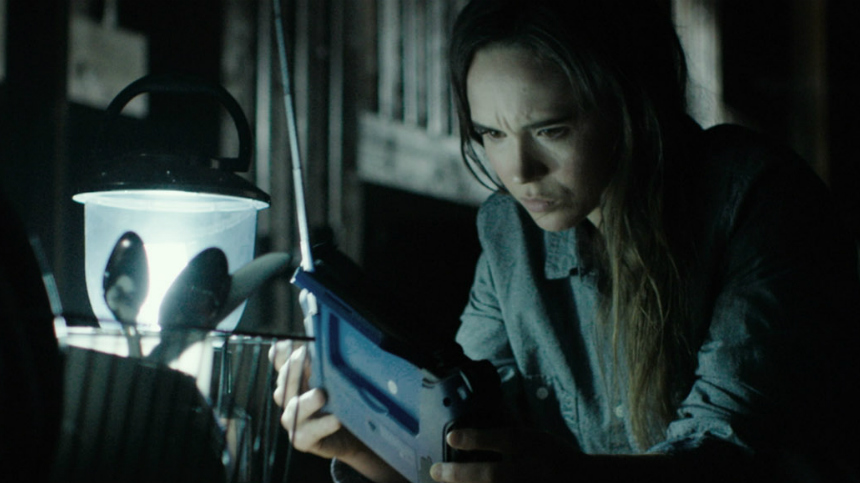Review: INTO THE FOREST Focuses on Individuals to Superb Effect

What will we all do when the lights turn off? Wait impatiently for them to come back on, trying to maintain a normal existence and the planned future? Begin raiding other people's homes? Go off in search of some semblance of civilization? Or try to find a way to live in the new reality?
All this might depend on who you are with, and how that bond might strengthen or weaken. Such questions and more are explored in Into the Forest. Canadian auteur Patricia Rozema is back after too long an absence from the big screen, for a story that is perfect for her view on female relationships, sense of physical space (human and natural), and ability to create intimacy in the grand narrative.
Two sisters, Nell (Ellen Page) and Eva (Evan Rachel Wood), live with their widowed father Robert (Callum Keith Rennie) in a sophisticated yet environmentally-friendly home in the woods of northern California. A few hours drive from the nearest town, Nell is preparing for the SATs, and Eva for a dance school audition. One day, the power goes out, and the family slowly realize that it might never come back on. Isolated from other humans, the sisters must navigate this new existence in which their future is uncertain.
Based on the novel of the same name by Jean Hegland, this is not an examination of how civilization ends, but how individuals must navigate a new existence with little knowledge or experience. Granted, Nell and Eva are in a privileged position, having a decent home, more resources, and living in an area with natural food sources. But desires for the future that was to be, and creature comforts, keep reality at bay.
Both Nell and Eva at first refuse to accept fate, with Nell studying (now with books instead of a computer) and Eva practising (with only a metronome). Nell is young enough to retain her naiveté longer, while Eva soon cracks under the pressure of knowing all she had hoped for is gone. Their adaptation to a life without electricity and little contact with other humans comes in fits and starts, and the sister switch positions frequently: one falls apart, then the other, but always in an understandable and natural manner.
Rozema and cinematographer Daniel Grant emphasize the movement from the unnatural to the natural world. Surrounded as they are by such beauty, Nell and Eva still cannot accept that such beauty will not much longer be only something to view, but something they must live within. This natural world is at times frightening, and at other times wonderous, The cause of the apocalypse is never explained, which is as it should be, as the 'why' is irrelevant.
It is the human world that proves too challenging, with one young man's love for Nell almost pulling the sisters apart, and another man with more sinister intentions almost destroying them both. Rozema times the slow decay of the house and its melding into the woods perfectly: the film is shot as if the woods are saying, this is how it was always meant to be.
A film such as this is held together by its performances, and luckily both Page and Wood give two of the best performances of their careers to this point. You would never know that they had not known each other all of their lives; the bond they create on screen as sisters is undeniable and completely compelling. Nell is the intellectual, and Eva is the artist; both are lost in a world where their talents cannot be realized.
Their personalities are more or less formed in such a way that this adjustment does not come easily, and even their ingenuity often masks their desire for certain life rituals to be realized, even though that is now impossible. Nell is smart but stubborn and headstrong as befits her age; Eva is kind and quiet, but finds her role as older sister almost too much to bear. Each of their setbacks is painful for the audience, each of their triumphs a joy.
Their family happiness, established at the beginning of the film, might seem a little too perfect, but this is the kind of family many of us either have or wish we had, one that has fights but comes together in crisis. Stupid mistakes are made, but they are mistakes we all could make. The arguments between the sisters, over men, supplies, and just about everything because this is the end of civilization and everything is a source of anxiety, are presented without judgment or leaning to one side or the other.
I would love to see a double bill of Mad Max: Fury Road and Into the Forest; there are interesting commonalities, as films examining the (post) apocalypse, and both centring on female characters, and indeed the particular issues of women in such a scenario. And while the former focuses on how to run the world, the latter focuses on how to live in it, both in a practical and emotional manner. (Also, why is this only Rozema's sixth feature in nearly 30 years?!?! Please, producers/distributors/studios, give her all of your money).
Into the Forest takes a scenario that too often focuses on the macrocosmic, and instead turns to the microcosmic, focusing on individuals and the capacity to adapt to the most unthinkable to circumstances. With stellar performances, gorgeous cinematography, fascinating production design, all put together by a top-notch director, it is definitely the best film I've seen at TIFF, and will likely make it into my top five of the year.
Review originally published during the Toronto International Film Festival (TIFF) in September 2015. The film will open in select U.S. theaters on Friday, July 29, via A24 Films.

Do you feel this content is inappropriate or infringes upon your rights? Click here to report it, or see our DMCA policy.






